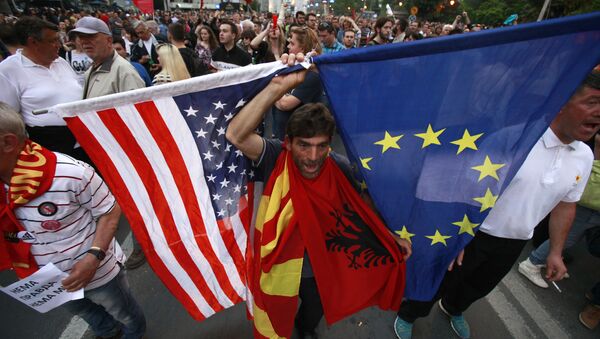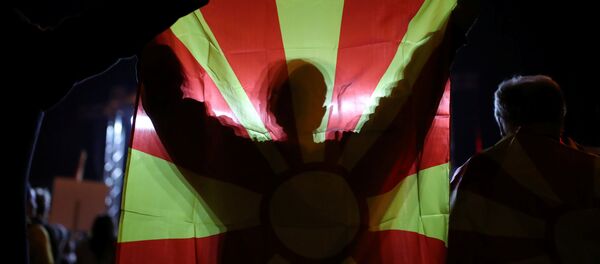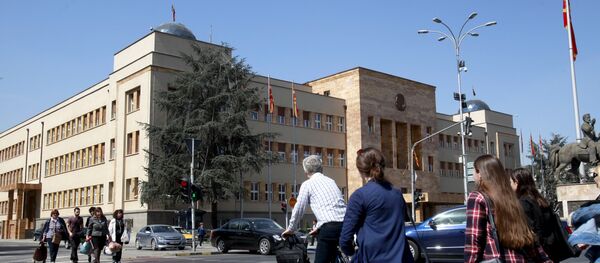Slightly less than 37 percent of the Macedonian electorate showed up to vote on Sunday, but over 90 percent of them supported the new name, agreed by Greece and Macedonia in June.
Importance of Names
The two countries agreed that the new name should be the Republic of North Macedonia. The deal resolved the decades-long dispute between Athens and Skopje over the use of "Macedonia," which is also the name of a region in Greece.
READ MORE: North Macedonia Referendum: How Many Nations Have Changed Their Names and Why?
If the deal is approved in Macedonia, it will pave the way for the country to pursue membership of NATO and the European Union, which Greece could veto in the past over its objection to the name.
Greek Syriza Supportive of Referendum
Vice-President of the European Parliament and a member of the Greek ruling Syriza party Dimitrios Papadimoulis called the result of the vote a "positive development."
"This is a very important and positive development. Participation was low, it has a consultative character and PM Zaev still has the upper hand in decision-making. The next step now is for the Parliament to ratify the deal and for Zaev to reach the necessary qualified majority of two-thirds," Papadimoulis told Sputnik.
READ MORE: Greece Sees Results of Macedonian Referendum as Controversial But Respects Them
According to Papadimoulis, Zaev "can secure the necessary qualified majority," but he could succeed even if he had to call a snap election.
"Such a development could delay the entire process, but we could live with that as long as Zaev can manage to push for the adoption of constitutional reforms," Papadimoulis said.
The Greek politician stressed that the failure to sign the agreement and, therefore, to join NATO and the European Union would be "a defeat of progressive, pro-European forces."
Stelios Kouloglou, a vice-chair of the European Parliament's Committee on Development and a member of the Syriza party, stressed that the stability in the Balkans would be "at stake" if the name change deal was not approved in Macedonia.
"This agreement is for the best interest of both our countries and for the area that is getting into turmoil again. Unfortunately, the conservative parties that belong to the EPP in the European Parliament, have adopted a nationalistic demagogic position that goes against peace and stability," Kouloglou told Sputnik.
Opposition Wants No Name Change
However, not everyone in Macedonia approves of the name change and subsequent attempts to join NATO or the European Union.
Janko Bachev, the president of United Macedonia opposition party, hailed the results of the low-turnout referendum as the victory of opposition. According to Bachev, the majority of Macedonians were not interested in EU or NATO membership.
"The future of the world belongs to Russia, China and the rest of the BRICS countries and Macedonia must fit in that future," the opposition politician told Sputnik.
According to the expert, the people of Macedonia would have more freedom in deciding its own future if it stayed out of both blocs.
"The Balkan people have already a bitter taste of NATO’s actions via the war and the destruction of Yugoslavia," the expert said.
Stability in Balkans
Gen. Francis Briquemont, who was head of the UN Protection Force in Bosnia and Herzegovina in 1993-1994, said the referendum in Macedonia reminded him of the 1992 Bosnian independence referendum, largely boycotted by the Bosnian Serbs.
"It could be like what happened some 25 years ago when the Serbs refused to participate and boycotted the vote in Bosnia," the retired Belgian general told Sputnik.
READ MORE: NATO Welcomes Results of Referendum on Macedonia's Name — Stoltenberg
Briquemont, who has a first-hand experience of conflict in the Balkans, said he is wary of NATO's expansion and growing budget.
"To justify an increase of its budgets — the famous increase of member states military budgets to reach 2 percent of GDP — NATO creates itself an enemy: Russia," Briquemont said.
Russia itself said, regarding the referendum, it was hoping that everything would remain within the legal framework.




